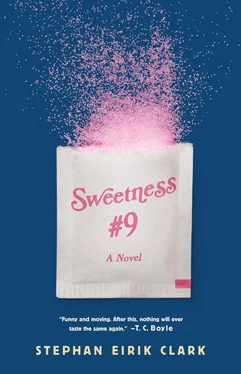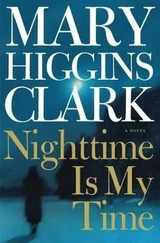“I still can’t believe the crescent rolls have red dye in them,” Betty said, holding the twist-to-open cylinder up before her eyes so she could read its list of ingredients.
I didn’t need to repeat myself: I’d already told her that Yellow No. 5 was combined with the red food coloring to give the cooked dough a golden, just-from-the-oven appearance.
“And the Sweetness #9 holds it all together,” Priscilla said.
“Get the lid,” I told her.
She held the garbage can open, and then I emptied the bag into it and we stood for a moment over the detritus of our sweet and colorful past.
When we returned indoors, Ernest was sitting at the kitchen table, drinking a bloodied orange juice. He wouldn’t look at us. Instead, he reached for the little bottle of red food coloring that sat on the table beside him, then added another couple of drops into his glass.
I nodded to Betty and Priscilla, asking for a moment alone. Then, when it was just me and my son, I sat down across from him and placed my hands on the table where he could see them.
“Ernest,” I said. “You understand why we’re doing this, don’t you?”
And that puckered look he gave me — so intense, somehow already soured to the world — it was the same one I’d seen when I first held him in my arms at the hospital and knew in a rush of love and sadness that he was my son. Ernest, I’d call him. I knew the only name I could give him was Ernest.
There had been a time when having breakfast with my mentor was the highlight of my week. We’d sit and read the trades or discuss the merits of the latest Flexible Package Achievement Award winner, or sometimes chat with a visiting scholar or chemist passing through town. My mentor’s row house was like a celebrated salon. Hours would pass without my realizing it as we broke down the scent or flavor of some beloved brand like Old Spice or Coca-Cola, both of which are built on the same strong pillars of lemon, orange, cinnamon, ginger, and vanilla. I never felt like anything less than a captain of industry in his company, a man who’d risen high enough to tell the world when his day would begin and end.
But since I had been promoted to Chief Flavorist, our visits had changed. I kept wanting to check my watch when I was with him, and I only refrained from doing so because his generosity made me feel so ashamed. The first Thursday after that Society meeting, Ernst told me just what my promotion entailed, but he didn’t speak extemporaneously; he consulted a series of index cards, his entire morning’s conversation seemingly rehearsed and scripted. When he finished with one topic, he moved one card to the end of the pack and read from the next. The following week I sent Tennessee over in my place, both in an effort to placate my colleague (though I think this visit only reminded him of the heights he had not attained) and because I’d had to take my son at the last minute to a specialist in Manhattan to see about his verblessness. So many more doctor’s appointments followed in the coming weeks that I went a month without seeing Ernst. Then when I did return to his table, I only did so in the company of Koba or Beekley or Tennessee, because I found it so difficult to sit there alone with him anymore and think of how diminished he now seemed.
Owing to this, I reacted with equal parts shame and fear when I got a text from Eliza that Sunday telling me that Ernst would like to have me over for lunch. I was so certain that he had taken notice of my absenteeism that I rehearsed an apology on the drive over.
When I got there and heard no response to my knock, I reached for the spare key above the lamp and stepped inside calling out for Ernst and then Eliza.
My mentor emerged from the kitchen, but almost as soon as I saw him I averted my eyes and moved toward the bench in the hall, busying myself with my coat and my shoes.
“Sorry I’ve been such a stranger,” I said. “There’s just been so much going on with the family, and then everything at work.”
He stood there tight with fear, as if not recognizing me. He was bare-footed as well, and dressed in pajama bottoms and a plain white T-shirt.
“Aren’t you cold?” I said. “At least put your house shoes on. Winter’s here.”
He did as I instructed, then followed me into the kitchen, where I saw the sink was once again filthy. A tower of dishes rose from it, with nubs of bread and coffee grounds floating in the stagnant water trapped on each level.
“You should hire someone if Eliza insists on keeping house like this.”
“Eliza,” he said.
I turned round, as if expecting to see her come in from the hall, then noticed that nothing had been prepared. I crossed to the oven and asked if he’d like me to cook. “How’s pizza sound?” I turned on the oven, then found a ready-made shell and a packet of shredded cheese in the fridge, along with a can of olives and a jar of sauce in the cabinet. Ernst sat and watched as I spooned the marinara into place and sprinkled the cheese over it, and then I handed him the can of olives, asking if he’d like to split the bottle of Dunkle Weisse I’d seen in the fridge.
He grunted his assent, so I went for the bottle and an opener, and as I reached into the cupboards for two glasses, I noticed what he was doing at the table — putting all of the olives in one place. He’d piled them as high as my fist.
“Ernst.” An acrid odor turned me round from him to the oven. Tendrils of black smoke rushed up from its door. “My god!” I pulled it open, sending a rush of smoke to the ceiling and causing the fire alarm to sound. I grabbed a pair of metal tongs and reached inside for the offending item, then flung it down into the sink. It landed with a hiss. I turned the water on over it. A few scraps of burnt wool, some charred leather buttons, a curled elbow patch. His sweater.
“Why would you put your sweater in the oven?” I said, and he looked at me with no less confusion than I showed him.
“I was cold,” he said.
The alarm continued to bleat.
“Oh, Ernst.”
“I was cold.”
I didn’t pack a suitcase for him. I thought I’d only need to drop him at Eliza’s condo. But when I got there, I found a letter waiting for us, taped to the door and addressed to me.
You don’t know what it’s like, she wrote. He lives in the past more than the present, and while that may have been fine when he’d at least reminisce about our good times in the sixties, now it’s like he doesn’t even know me anymore, like I haven’t even been born yet. This morning he told me about his “one true love,” some Magda he knew during the war. “I’ll never feel like that again,” he said. He couldn’t understand why I was crying.
She worried I’d turn her into a villain, and as if to overcome this she mentioned that she didn’t plan to keep the condo. She only wanted to know that I wouldn’t come searching for her. I was away twenty-five years, she wrote, and now I’m supposed to be his caretaker? We’ve been together less than five years across five decades; we don’t have enough memories in the bank for that. And I’ve already done this once before, with Luther —her first husband. It’s your turn now. Your turn to learn more than you ever wanted to know.
The first time Beekley showed me his orange van, he spoke of it like a blue-blood gushing over a cherished yacht. I didn’t understand it. “Men in vans don’t marry,” I’d told him. “They have their photographs stapled to telephone poles.” This morning, though, I was glad to be able to call on it. With it, Beekley collected all of the many things from my mentor’s home that I thought might make Ernst feel more comfortable with me at home: a suitcase full of clothes, his favorite armchair, the cuckoo clock, a handful of framed photographs, and some familiar dishes and food from his kitchen, including a box of Sweetness #9 that Koba had grabbed from the cupboard.
Читать дальше












